Lesson 129-130 (第二课时)(课件)(共57张PPT) 新概念英语第一册
文档属性
| 名称 | Lesson 129-130 (第二课时)(课件)(共57张PPT) 新概念英语第一册 | 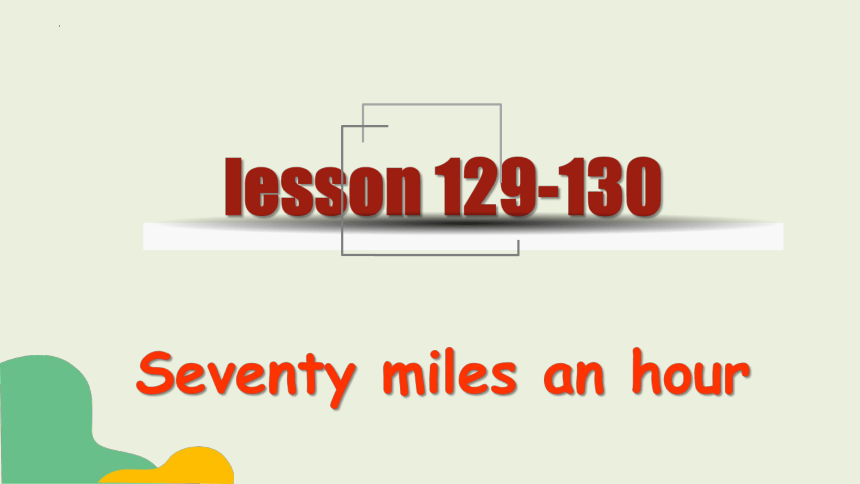 | |
| 格式 | pptx | ||
| 文件大小 | 4.8MB | ||
| 资源类型 | 教案 | ||
| 版本资源 | 新概念英语 | ||
| 科目 | 英语 | ||
| 更新时间 | 2024-01-08 20:37:20 | ||
图片预览

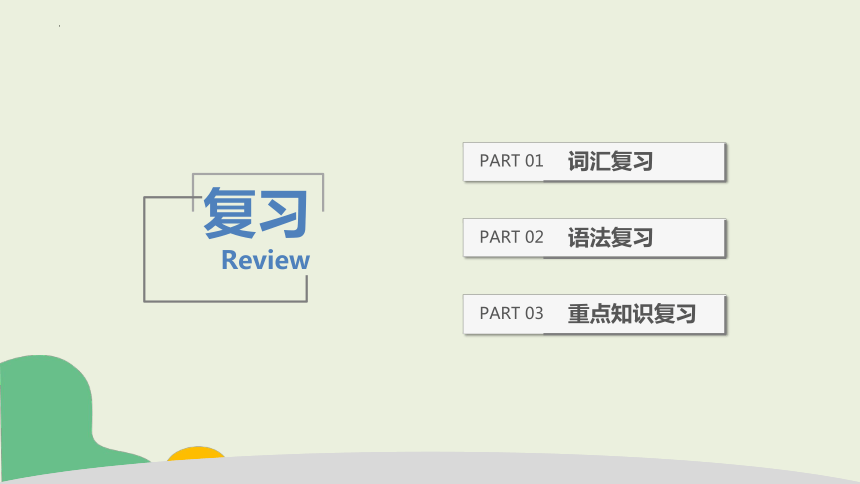
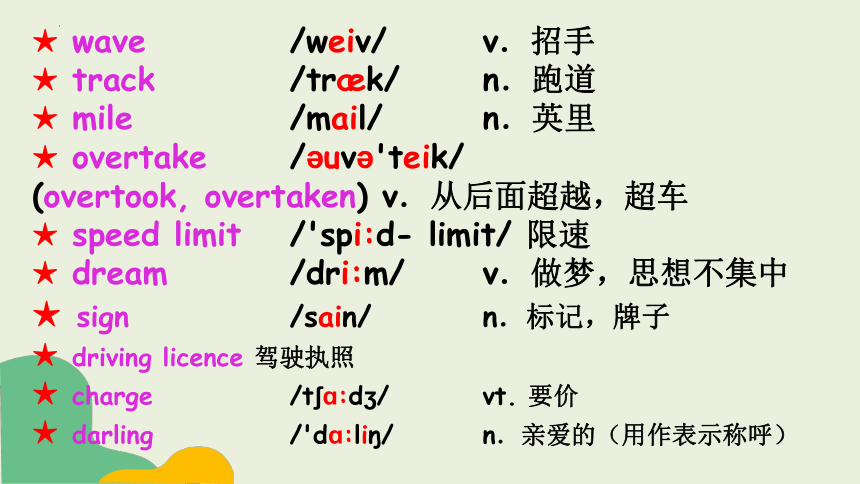
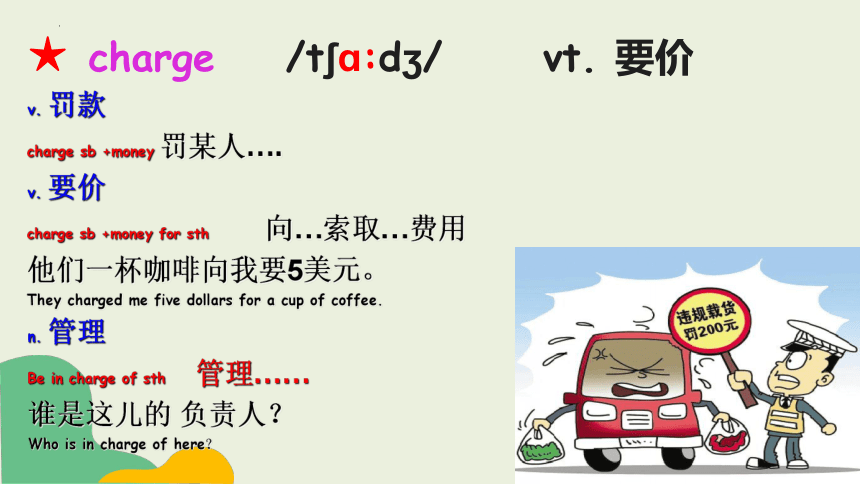

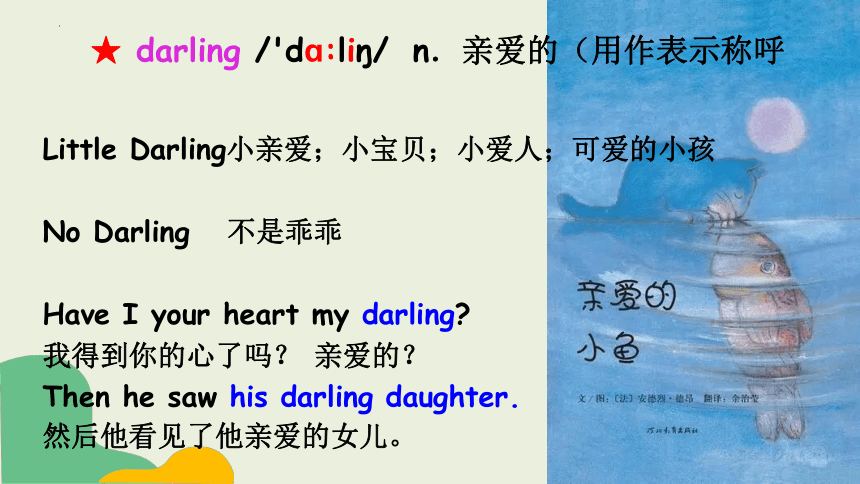

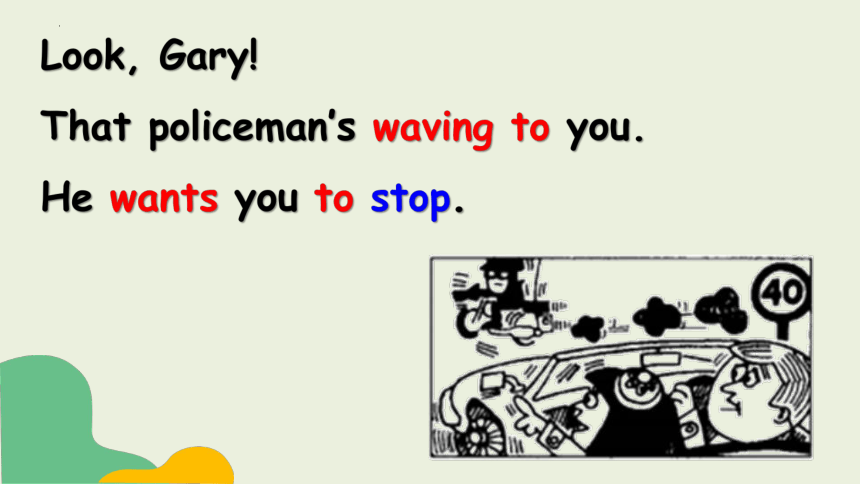
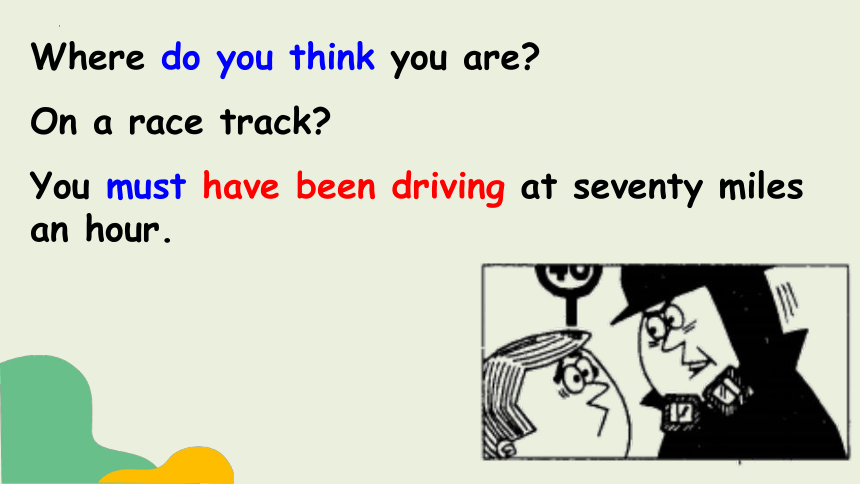
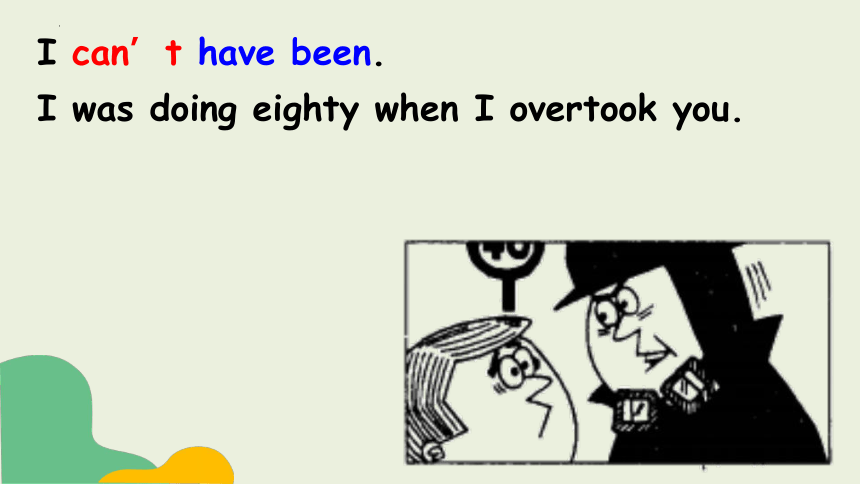
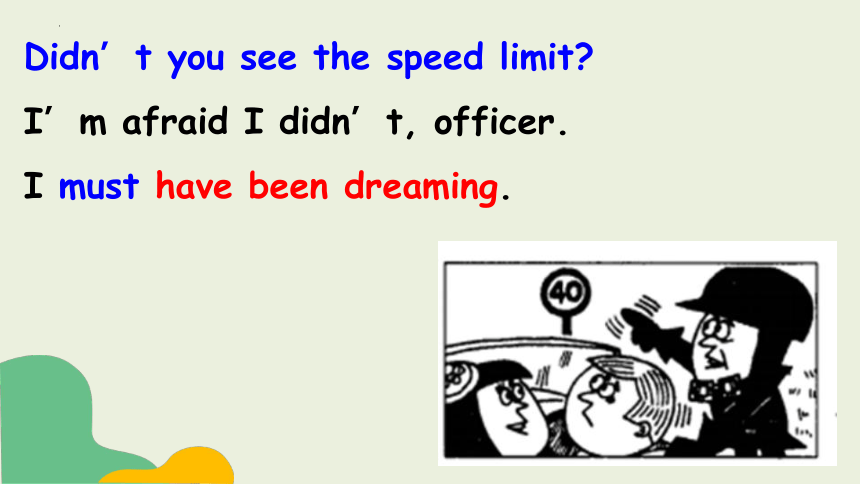
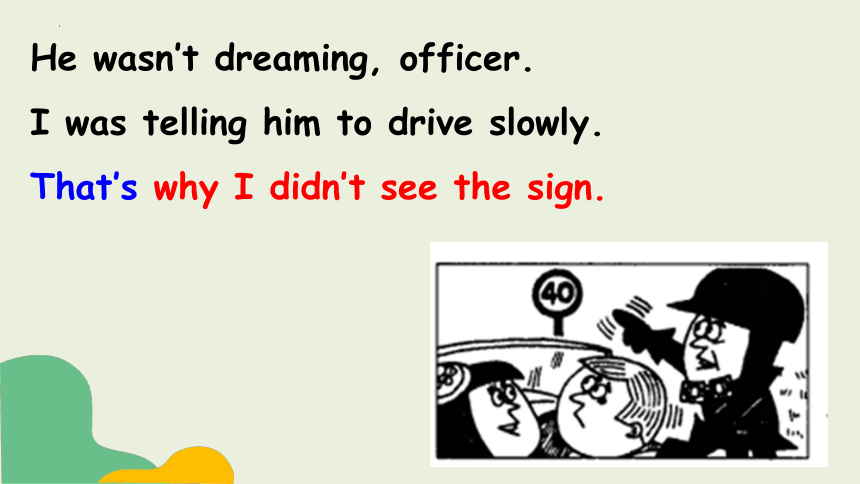
文档简介
(共57张PPT)
lesson 129-130
Seventy miles an hour
PART 01 词汇复习
复习
Review
PART 02 语法复习
PART 03 重点知识复习
★ wave /weiv/ v.招手
★ track /tr k/ n.跑道
★ mile /mail/ n.英里
★ overtake / uv 'teik/
(overtook, overtaken) v.从后面超越,超车
★ speed limit /'spi:d- limit/ 限速
★ dream /dri:m/ v.做梦,思想不集中
★ sign /sain/ n.标记,牌子
★ driving licence 驾驶执照
★ charge /t ɑ:d / vt. 要价
★ darling /'dɑ:li / n.亲爱的(用作表示称呼)
★ charge /t ɑ:d / vt. 要价
v. 罚款
charge sb +money 罚某人….
v. 要价
charge sb +money for sth 向…索取…费用
他们一杯咖啡向我要5美元。
They charged me five dollars for a cup of coffee.
n. 管理
Be in charge of sth 管理……
谁是这儿的 负责人?
Who is in charge of here?
in charge 负责,主管;在…看管下
in charge of 负责;主管
charge of 负责;管理
free of charge 免费
take charge 掌管,负责;主持;不受控制
charge for 索价,要价;为…收费
take charge of 接管,负责
person in charge 负责人
service charge 服务费
no charge 免费;不需付钱
extra charge 附加费;附加负载
phrase
★ darling /'dɑ:li / n.亲爱的(用作表示称呼
Little Darling小亲爱;小宝贝;小爱人;可爱的小孩
No Darling 不是乖乖
Have I your heart my darling
我得到你的心了吗? 亲爱的?
Then he saw his darling daughter.
然后他看见了他亲爱的女儿。
课文串讲
Seventy miles an hour
Look, Gary!
That policeman’s waving to you.
He wants you to stop.
Where do you think you are
On a race track
You must have been driving at seventy miles an hour.
I can’t have been.
I was doing eighty when I overtook you.
Didn’t you see the speed limit
I’m afraid I didn’t, officer.
I must have been dreaming.
He wasn’t dreaming, officer.
I was telling him to drive slowly.
That’s why I didn’t see the sign.
Let me see your driving licence.
I won’t charge you this time. But you’d better not do it again!
Thank you. I’ll certainly be more careful.
I told you to drive slowly, Gary.
You always tell me to drive slowly, darling.
Well, next time you’d better take my advice!
课文精讲
Look, Gary! That policeman’s waving to you. He wants you to stop.
wave to you 向你招手
Where do you think you are On a race track
do you think 插入语,
插入在疑问词之后表示强调,并不是疑问,
它用于征询见解或表达看法。
你认为你现在应做什么?
What do you think you can do now
你认为他是谁? Who do you think he is
你猜我今天花了多少钱?
How much do you guess I spent today
on a race track
= Do you think you are on a race track
You must have been driving at seventy miles an hour.
must 一定是(表示猜测)
其基句型结构有:
1)must + 动词原形
你一定是病了。 You must be sick.
2)must +be+ v-ing
他们一定在喝酒。 They must be drinking now.
3)must +have +过去分词 表示过去动作的猜测
昨晚你一定喝酒了。
You must have drunk last night.
4)must + have been+ v-ing
表示对过去某一时刻,某一时间内的动作的猜测,或过去一直到现在的一段时间内动作的猜测。
昨天晚上我给你打电话的时候你肯定在喝酒
You must have been drinking when I called you last night.
前两周你肯定在为会议做准备工作。
You must have been preparing for the meeting in the last two weeks.
表示速度用at.
以每秒1000英里的速度
at 1000 miles a second
I can’t have been.
= I can’t have been driving at seventy miles an hour.
can’t (must表猜测时的否定形式)不可能
他不可能在伦敦,我今儿早还在这见到他的。
He can’t be in London. I saw him here only this morning.
你不可能在家,我都能听见火车的声音。
You can’t be at home. I can hear the noise of the train.
他们不可能昨天把活儿干完。
They can’t have finished their job yesterday.
你不可能是一直一个人呆着
You can’t have been staying alone.
I was doing eighty when I overtook you.
I was doing eighty.
=I was driving at eighty miles an hour.
overtake 超过
Didn’t you see the speed limit
I’m afraid I didn’t, officer.
I didn’t =I didn’t see the speed limit.
I must have been dreaming.
dream n. 梦; v. 做梦
这里引申为“思 想 开小差。”
He wasn’t dreaming, officer. I was telling him to drive slowly.
was telling 用进行时态加强语气证明“我一直都在告诉他”。
tell sb to do sth 告诉(叫)某人做…
叫他停下来。
Tell him to stop.
叫他走近点。
Tell him to come closer.
That’s why I didn’t see the sign.
That’s why….”所以“(用于解释原因)
这就是我迟到的原因 That’s why I was late.
这就是我生气的原因。 That’s why I am angry.
Let me see your driving licence.
Let sb do sth 让某人做某事
让我告诉你原因吧!
Let me tell you the reason.
I won’t charge you this time. But you’d better not do it again!
charge 罚款
you’d better =you had better
had better do sth 最好做某事(表建议)
had better not do sth
你最好早点回来。
You’d better come back early.
你最好别告诉他实情。
You’d better not tell him the truth.
Thank you. I'll certainly be more careful.
I told you to drive slowly, Gary.
Tell sb to do sth 告诉某人做某事
You always tell me to drive slowly, darling.
Well, next time you’d better take my advice!
take one’s advice 接受某人的意见,听从某人的劝告,听某人的话。
我总告诉你要注意,但你从来不听我的话。
I always tell you to be careful, but you never take my advice.
Key knowledge
情态动词表推测(一)
用法
对现在、将来的推测及现在正在发生的推测
肯定的推断:
否定的推断:
must be 肯定是
can’t be 不可能是
must + do(动词原形) 肯定
can’t + do (动词原形) 否定
表示对现在或将来的推测
1
2. 情态动词+be doing,
表示对现在正在发生情况进行推测。
must+be doing,
表示对现在的情况进行肯定推测。
can’t+be doing,
表示对现在正在发生情况进行否定推测。
Key knowledge
情态动词表推测 (二)
用法
对过去的推测及过去正在发生的推测
对过去的推测及过去正在发生的推测
1. 对过去的推测
(1)肯定推测:must have been “那时一定是”
我认为他那时一定很累。
I think he must have been tired.
我认为他们那时一定很忙。
I think they must have been busy。
(2)否定推测:can’t have been “那时不可能是”
我认为他那时不可能累。
I think he can’t have been tired.
我认为他们那时不可能很忙。
I think they can’t have been busy。
2. 过去正在发生的推测
1)肯定推测:must have been doing “那时一定正在做…”
我认为他那时一定正在睡觉。
I think he must have been sleeping.
我认为他们那时一定正在读书。
I think they must have been reading。
(2)否定推测:can’t have been doing “那时不可能正在”
我认为他那时不可能正在睡觉。
I think he can’t have been sleeping.
我认为他们那时不可能正在读书。
I think they can’t have been reading。
在反义疑问句中,
附加疑问句部分不用can或mustn’t,而是根据后面的实义动词来确定。
如果主句中有表示过去的时间状语,问句部分用didn't;
若没有表示过去的时间状语,问句部分用haven't或hasn't。
They must have gone there last night, didn't they
他们昨晚肯定去那里了,不是吗?
Tom must have been to the Great Wall, hasn't he
汤姆一定去长城了,不是吗
You can’t have slept well last night, did you
你昨天晚上没睡好,是不是?
lesson 129-130
He can’t have been…他不可能……
He must have been… 他肯定是…..
He _____________ ( 那时不可能生病)。
He ______________ (一定是累了)。
can’t have been ill
must have been tired
It ______________(一定是)my new________
It ______________ (不可能是)my old one
must have been
can’t have been
hat
She ____________ (不可能是)Danish.
She _____________ (一定是)Swedish.
can’t have been
must have been
He ____________________ (不可能是一个牙医).
He ____________________ (一定是一个医生).
can’t have been a dentist
must have been a doctor
She ____________ (不可能40岁).
She _____________ (一定是50岁).
can’t have been 40
must have been 50
It ______________ (不可能是20号)
It______________ ( 一定是21号)。
can’t have been the 20th
must have been the 21st
He ____________ (不可能是最年轻的).
He _____________ (一定是最年长的).
can’t have been the youngest
must have been the oldest
He ____________ (不可能一直在看书).
He ____________ (一定一直在睡觉).
can’t have been reading
must have been sleeping
Key knowledge
插入语
另
插入语
定义:
在一个句子中间插入一个成分,它不作句子的何种成分,也不和句子的何种成分发生结构关系,同时既不起连接作用,也不表示语气,这个成分称之插入语。
插入语的作用:
插入语一般对一句话作一些附加的说明。它是中学英语语法的重点,也是高考的考点。通常与句中其它部分没有语法上的联系,将它删掉之后,句子结构仍然完整。
插入语在句中有时是对一句话的一些附加解释、说明或总结;有时表达说话者的态度和看法;有时起强调的作用;有时是为了引起对方的注意;还可以起转移话题或说明事由的作用;也可以承上启下,使句子衔接得更紧密一些。
插入语的类型
掌握这一语言现象不仅有利于对英语句子等的理解,还有利于提高写作等的水平。插入语的类型较多,常见的如下几种:
一、形容词(短语)作插入语。
能用作插入语的形容词(短语)常见的有:true,wonderful,excellent,等。
如:True,it would be too bad.
真的,太糟了。
Wonderful,we have won again.
太好了,我们又赢了。
二、副词(短语)作插入语。
能用作插入语的副词(短语)有:still,however,luckily,maybe等。
如:When he got there,he found,however,that the weather was too bad.
可是到了那儿之后他发现,那儿的天气太坏了。
三、介词短语作插入语。
能用作插入语的介词短语有:in fact,in other words,of course,on the contrary,等。
如:You can’t wait anymore-in other words,you should start at once.
你不能再等了——换言之,你得立即出发。
On the contrary,we should strengthen our cooperation with them.
相反,我们应该加强和他们的合作。
四、V-ing(短语)作插入语。
能用作插入语的V-ing(短语)常见的有:generally speaking,judging by等。
如:Generally speaking,the weather there is neither too cold in winter nor too hot in summer.
一般来说,那儿的气候冬天不太冷,夏天不太热。
Judging by his clothes,he may be an artist.
从衣着来判断,他可能是个艺术家。
五、不定式短语作插入语。
能用作插入语的不定式短语有:to be honest,to tell you the truth等。
如:To tell you the truth,I’m not so interested in the matter.
跟你说实话,我对这件事情的兴趣不大。 。
六、句子(陈述句和一般疑问句)作插入语。
能用作插入语的句子有:I am sure,I believe,I think,I know,I hope,you see, what’s more,that is to say,as we know,as I see,believe it or not等。
如:I believe,China will catch up with the developed countries sooner or later.
我确信,中国迟早会赶上发达国家。
He can’t pass the exam,because he doesn’t study hard. What’s more,he isn’t so clever.
他不能通过这次考试,因为他学习不认真,更何况他又不太聪明。
另
lesson 129-130
Seventy miles an hour
PART 01 词汇复习
复习
Review
PART 02 语法复习
PART 03 重点知识复习
★ wave /weiv/ v.招手
★ track /tr k/ n.跑道
★ mile /mail/ n.英里
★ overtake / uv 'teik/
(overtook, overtaken) v.从后面超越,超车
★ speed limit /'spi:d- limit/ 限速
★ dream /dri:m/ v.做梦,思想不集中
★ sign /sain/ n.标记,牌子
★ driving licence 驾驶执照
★ charge /t ɑ:d / vt. 要价
★ darling /'dɑ:li / n.亲爱的(用作表示称呼)
★ charge /t ɑ:d / vt. 要价
v. 罚款
charge sb +money 罚某人….
v. 要价
charge sb +money for sth 向…索取…费用
他们一杯咖啡向我要5美元。
They charged me five dollars for a cup of coffee.
n. 管理
Be in charge of sth 管理……
谁是这儿的 负责人?
Who is in charge of here?
in charge 负责,主管;在…看管下
in charge of 负责;主管
charge of 负责;管理
free of charge 免费
take charge 掌管,负责;主持;不受控制
charge for 索价,要价;为…收费
take charge of 接管,负责
person in charge 负责人
service charge 服务费
no charge 免费;不需付钱
extra charge 附加费;附加负载
phrase
★ darling /'dɑ:li / n.亲爱的(用作表示称呼
Little Darling小亲爱;小宝贝;小爱人;可爱的小孩
No Darling 不是乖乖
Have I your heart my darling
我得到你的心了吗? 亲爱的?
Then he saw his darling daughter.
然后他看见了他亲爱的女儿。
课文串讲
Seventy miles an hour
Look, Gary!
That policeman’s waving to you.
He wants you to stop.
Where do you think you are
On a race track
You must have been driving at seventy miles an hour.
I can’t have been.
I was doing eighty when I overtook you.
Didn’t you see the speed limit
I’m afraid I didn’t, officer.
I must have been dreaming.
He wasn’t dreaming, officer.
I was telling him to drive slowly.
That’s why I didn’t see the sign.
Let me see your driving licence.
I won’t charge you this time. But you’d better not do it again!
Thank you. I’ll certainly be more careful.
I told you to drive slowly, Gary.
You always tell me to drive slowly, darling.
Well, next time you’d better take my advice!
课文精讲
Look, Gary! That policeman’s waving to you. He wants you to stop.
wave to you 向你招手
Where do you think you are On a race track
do you think 插入语,
插入在疑问词之后表示强调,并不是疑问,
它用于征询见解或表达看法。
你认为你现在应做什么?
What do you think you can do now
你认为他是谁? Who do you think he is
你猜我今天花了多少钱?
How much do you guess I spent today
on a race track
= Do you think you are on a race track
You must have been driving at seventy miles an hour.
must 一定是(表示猜测)
其基句型结构有:
1)must + 动词原形
你一定是病了。 You must be sick.
2)must +be+ v-ing
他们一定在喝酒。 They must be drinking now.
3)must +have +过去分词 表示过去动作的猜测
昨晚你一定喝酒了。
You must have drunk last night.
4)must + have been+ v-ing
表示对过去某一时刻,某一时间内的动作的猜测,或过去一直到现在的一段时间内动作的猜测。
昨天晚上我给你打电话的时候你肯定在喝酒
You must have been drinking when I called you last night.
前两周你肯定在为会议做准备工作。
You must have been preparing for the meeting in the last two weeks.
表示速度用at.
以每秒1000英里的速度
at 1000 miles a second
I can’t have been.
= I can’t have been driving at seventy miles an hour.
can’t (must表猜测时的否定形式)不可能
他不可能在伦敦,我今儿早还在这见到他的。
He can’t be in London. I saw him here only this morning.
你不可能在家,我都能听见火车的声音。
You can’t be at home. I can hear the noise of the train.
他们不可能昨天把活儿干完。
They can’t have finished their job yesterday.
你不可能是一直一个人呆着
You can’t have been staying alone.
I was doing eighty when I overtook you.
I was doing eighty.
=I was driving at eighty miles an hour.
overtake 超过
Didn’t you see the speed limit
I’m afraid I didn’t, officer.
I didn’t =I didn’t see the speed limit.
I must have been dreaming.
dream n. 梦; v. 做梦
这里引申为“思 想 开小差。”
He wasn’t dreaming, officer. I was telling him to drive slowly.
was telling 用进行时态加强语气证明“我一直都在告诉他”。
tell sb to do sth 告诉(叫)某人做…
叫他停下来。
Tell him to stop.
叫他走近点。
Tell him to come closer.
That’s why I didn’t see the sign.
That’s why….”所以“(用于解释原因)
这就是我迟到的原因 That’s why I was late.
这就是我生气的原因。 That’s why I am angry.
Let me see your driving licence.
Let sb do sth 让某人做某事
让我告诉你原因吧!
Let me tell you the reason.
I won’t charge you this time. But you’d better not do it again!
charge 罚款
you’d better =you had better
had better do sth 最好做某事(表建议)
had better not do sth
你最好早点回来。
You’d better come back early.
你最好别告诉他实情。
You’d better not tell him the truth.
Thank you. I'll certainly be more careful.
I told you to drive slowly, Gary.
Tell sb to do sth 告诉某人做某事
You always tell me to drive slowly, darling.
Well, next time you’d better take my advice!
take one’s advice 接受某人的意见,听从某人的劝告,听某人的话。
我总告诉你要注意,但你从来不听我的话。
I always tell you to be careful, but you never take my advice.
Key knowledge
情态动词表推测(一)
用法
对现在、将来的推测及现在正在发生的推测
肯定的推断:
否定的推断:
must be 肯定是
can’t be 不可能是
must + do(动词原形) 肯定
can’t + do (动词原形) 否定
表示对现在或将来的推测
1
2. 情态动词+be doing,
表示对现在正在发生情况进行推测。
must+be doing,
表示对现在的情况进行肯定推测。
can’t+be doing,
表示对现在正在发生情况进行否定推测。
Key knowledge
情态动词表推测 (二)
用法
对过去的推测及过去正在发生的推测
对过去的推测及过去正在发生的推测
1. 对过去的推测
(1)肯定推测:must have been “那时一定是”
我认为他那时一定很累。
I think he must have been tired.
我认为他们那时一定很忙。
I think they must have been busy。
(2)否定推测:can’t have been “那时不可能是”
我认为他那时不可能累。
I think he can’t have been tired.
我认为他们那时不可能很忙。
I think they can’t have been busy。
2. 过去正在发生的推测
1)肯定推测:must have been doing “那时一定正在做…”
我认为他那时一定正在睡觉。
I think he must have been sleeping.
我认为他们那时一定正在读书。
I think they must have been reading。
(2)否定推测:can’t have been doing “那时不可能正在”
我认为他那时不可能正在睡觉。
I think he can’t have been sleeping.
我认为他们那时不可能正在读书。
I think they can’t have been reading。
在反义疑问句中,
附加疑问句部分不用can或mustn’t,而是根据后面的实义动词来确定。
如果主句中有表示过去的时间状语,问句部分用didn't;
若没有表示过去的时间状语,问句部分用haven't或hasn't。
They must have gone there last night, didn't they
他们昨晚肯定去那里了,不是吗?
Tom must have been to the Great Wall, hasn't he
汤姆一定去长城了,不是吗
You can’t have slept well last night, did you
你昨天晚上没睡好,是不是?
lesson 129-130
He can’t have been…他不可能……
He must have been… 他肯定是…..
He _____________ ( 那时不可能生病)。
He ______________ (一定是累了)。
can’t have been ill
must have been tired
It ______________(一定是)my new________
It ______________ (不可能是)my old one
must have been
can’t have been
hat
She ____________ (不可能是)Danish.
She _____________ (一定是)Swedish.
can’t have been
must have been
He ____________________ (不可能是一个牙医).
He ____________________ (一定是一个医生).
can’t have been a dentist
must have been a doctor
She ____________ (不可能40岁).
She _____________ (一定是50岁).
can’t have been 40
must have been 50
It ______________ (不可能是20号)
It______________ ( 一定是21号)。
can’t have been the 20th
must have been the 21st
He ____________ (不可能是最年轻的).
He _____________ (一定是最年长的).
can’t have been the youngest
must have been the oldest
He ____________ (不可能一直在看书).
He ____________ (一定一直在睡觉).
can’t have been reading
must have been sleeping
Key knowledge
插入语
另
插入语
定义:
在一个句子中间插入一个成分,它不作句子的何种成分,也不和句子的何种成分发生结构关系,同时既不起连接作用,也不表示语气,这个成分称之插入语。
插入语的作用:
插入语一般对一句话作一些附加的说明。它是中学英语语法的重点,也是高考的考点。通常与句中其它部分没有语法上的联系,将它删掉之后,句子结构仍然完整。
插入语在句中有时是对一句话的一些附加解释、说明或总结;有时表达说话者的态度和看法;有时起强调的作用;有时是为了引起对方的注意;还可以起转移话题或说明事由的作用;也可以承上启下,使句子衔接得更紧密一些。
插入语的类型
掌握这一语言现象不仅有利于对英语句子等的理解,还有利于提高写作等的水平。插入语的类型较多,常见的如下几种:
一、形容词(短语)作插入语。
能用作插入语的形容词(短语)常见的有:true,wonderful,excellent,等。
如:True,it would be too bad.
真的,太糟了。
Wonderful,we have won again.
太好了,我们又赢了。
二、副词(短语)作插入语。
能用作插入语的副词(短语)有:still,however,luckily,maybe等。
如:When he got there,he found,however,that the weather was too bad.
可是到了那儿之后他发现,那儿的天气太坏了。
三、介词短语作插入语。
能用作插入语的介词短语有:in fact,in other words,of course,on the contrary,等。
如:You can’t wait anymore-in other words,you should start at once.
你不能再等了——换言之,你得立即出发。
On the contrary,we should strengthen our cooperation with them.
相反,我们应该加强和他们的合作。
四、V-ing(短语)作插入语。
能用作插入语的V-ing(短语)常见的有:generally speaking,judging by等。
如:Generally speaking,the weather there is neither too cold in winter nor too hot in summer.
一般来说,那儿的气候冬天不太冷,夏天不太热。
Judging by his clothes,he may be an artist.
从衣着来判断,他可能是个艺术家。
五、不定式短语作插入语。
能用作插入语的不定式短语有:to be honest,to tell you the truth等。
如:To tell you the truth,I’m not so interested in the matter.
跟你说实话,我对这件事情的兴趣不大。 。
六、句子(陈述句和一般疑问句)作插入语。
能用作插入语的句子有:I am sure,I believe,I think,I know,I hope,you see, what’s more,that is to say,as we know,as I see,believe it or not等。
如:I believe,China will catch up with the developed countries sooner or later.
我确信,中国迟早会赶上发达国家。
He can’t pass the exam,because he doesn’t study hard. What’s more,he isn’t so clever.
他不能通过这次考试,因为他学习不认真,更何况他又不太聪明。
另
同课章节目录
